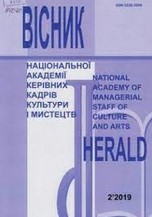«ІТАЛІЙКА В АЛЖИРІ» ДЖ. РОССІНІ В КОНТЕКСТІ ЕВОЛЮЦІЙНИХ ШЛЯХІВ РОЗВИТКУ ІТАЛІЙСЬКОГО МУЗИЧНОГО ТЕАТРУ ПОЧАТКУ XIX СТОЛІТТЯ
«ITALIAN IN АLGERIA» J. ROSSINI IN THE CONTEXT OF THE EVOLUTIONARY WAYS OF THE DEVELOPMENT OF THE ITALIAN MUSIC THEATER OF THE EARLY XIX CENTURY
Author(s): Antonina KuliievaSubject(s): Theatre, Dance, Performing Arts, Cultural history, Music, 19th Century, History of Art
Published by: Національна академія керівних кадрів культури і мистецтв
Keywords: opera-buffa; G. Rossini Musical Theater; «Italian in Algeria»; Risorgimento; Italian Musical Theater;
Summary/Abstract: The purpose of the study is to identify the poetic and intonational features of the opera «Italian in Algeria» by G. Rossini in the context of general evolutionary paths of development of the genre of Italian comic opera. The methodology is based on a combination of culturological, historical and musicological, hermeneutic and art studies, which together significantly deepens the study of genre and style specifics of opera by G. Rossini, in particular, «Italians in Algeria» as a new stage in the development of opera-buffa. The scientific novelty of the work is determined by its analytical perspective, which takes into account both the manifestations of aesthetic and stylistic guidelines of Rossini's opera «Italian in Algeria» and its genre specificity, adjusted to the Italian cultural and historical tradition of the early nineteenth century. Conclusions. The plot-semantic indicators of G. Rossini's «Italians in Algeria», on the one hand, show contact with the typology of the «classic» opera-buffa, as evidenced by the traditional comedy plot; the correlation of most of the heroes of the play with the types of Italian comedy masks; appeal to oriental (Turkish) themes, interpreted in the spirit of the ideas of the Enlightenment, as well as analogies with the Mozart Musical Theater and the comedies of JB Moliere. On the other hand, the opera demonstrates the innovative approach of its author, as evidenced by the final rondo of Isabella with the choir, which both in text and in intonation language appeals to the ideas of Italian culture on the eve of Risorgimento. Generalization of the intonation specificity of «Italian in Algeria» by G. Rossini demonstrates the originality of the relationship between traditions and innovations. The poetics of opera-buffa is manifested here in G. Rossini's masterful mastery of the art of opera ensemble; in the wide use of timbre-performance capabilities of buffoon bass, patter techniques, etc. The novelty of the work is manifested in the complexity of the images of the main characters, the richness of their intonation characteristics, which were based on the traditions of belcanto. This is primarily related to the image of Isabella, who ultimately gravitates to the ideas of national patriotism and thus greatly expands the expressive possibilities of the typology of opera-buffa in line with the socio-political and cultural realities of Italy in the early XIX century.
Journal: Вісник Національної академії керівних кадрів культури і мистецтв
- Issue Year: 2022
- Issue No: 2
- Page Range: 175-180
- Page Count: 6
- Language: Ukrainian

